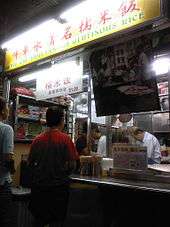Hawker centre

A hawker centre or cooked food centre (Chinese: 小贩中心 Xiǎofàn zhōngxīn or 熟食中心 shúshí zhōngxīn) is an open-air complex in Singapore, Malaysia, Hong Kong and the Riau Islands, housing many stalls that sell a variety of inexpensive food. They are typically found in city centres, near public housing estates or transport hubs (such as bus interchange ct or train stations).
In Singapore

Hawker centres sprang up in urban areas following the rapid urbanisation in the 1950s and 1960s. In many cases, they were built partly to address the problem of unhygienic food preparation by unlicensed street hawkers. More recently, they have become less ubiquitous due to growing affluence in the urban populations of Malaysia and Singapore. Particularly in Singapore, they are increasingly being replaced by food courts, which are indoor, air conditioned versions of hawker centres located in shopping malls and other commercial venues.
In the 1950s and 1960s, hawker centres were considered to be a venue for the less affluent. They had a reputation for unhygienic food, partly due to the frequent appearance of stray domestic pets and pests. Many hawker centres were poorly managed by their operators, often lacking running water and proper facilities for cleaning. More recently, hygiene standards have improved, with pressure from the local authorities. This includes the implementation of licensing requirements, where a sufficient standard of hygiene is required for the stall to operate, and rewarding exceptionally good hygiene. Upgrading or reconstruction of hawker centres was initiated in the late 1990s in Singapore. At the same time, hawker centres were renamed food centres.
The hawker centres in Singapore are owned by three government bodies, namely the National Environment Agency (NEA) under the parent Ministry of the Environment and Water Resources (MEWR), Housing and Development Board (HDB) and JTC Corporation. All the centres owned by HDB and NEA, in turn, are regulated by NEA with the individual Town Councils managing the HDB owned centres. JTC owned centres are self-managed. On 5 March 2010, NEA launched www.myhawkers.sg, which is an interactive web portal that offers useful information on hawker centres and food stalls. The portal allows registered users to review or recommend hawker stalls or hawker centres and to provide feedback to NEA on hygiene matters in hawker centres.
In Hong Kong

In Hong Kong, most cooked food centres (熟食中心; or cooked food markets, 熟食市場) are either located in market complexes of residential districts, or as a standalone structure (this being the case in most industrial areas), with only a few exception (e.g. Mong Kok Cooked Food Market is located in the lower levels of Langham Place Hotel). Cooked food centres are managed by Food and Environmental Hygiene Department.
Most of the stalls from hawker centres are converted from former dai pai dong by strict regulations and management; the Hong Kong Government regards the provision of cooked food centres as a way to eliminate traditional dai pai dongs from local streets in the 1970s. During the industrial boom in the 1960s and 1970s, the government also built cooked food markets in industrial areas in order to serve the catering needs of the working class in major industrial centres such as Kwun Tong, Tsuen Wan and Fo Tan.
Stalls in cooked food centres usually provide local cuisine, with those selling exotic delicacies a minority.
Notable hawker centres
The following lists some notable hawker centres:
Singapore
- ABC Brickworks Market and Food Centre
- Adam Road Food Centre
- Alexandra Road Hawker Centre
- Amoy Street Food Centre
- Bedok Central
- Boon Lay Place Food Village
- Bukit Timah Market and Food Centre
- Changi Village Food Centre
- Chinatown Complex
- Chomp Chomp Food Centre
- Circuit Road Food Centre
- Clementi Market and Food Centre
- East Coast Park Lagoon Food Village
- Eunos Crescent Market and Food Centre
- Fengshan Market and Food Centre
- Geylang Serai Market and Food Centre
- Ghim Moh Market and Food Centre
- Glutton's Bay
- Golden Mile Food Centre
- Golden Shoe Hawker Centre
- Hong Lim Complex
- Kovan Hougang Market Food Centre
- Lau Pa Sat
- Lavender Food Square
- Maxwell Food Centre
- Marine Parade Food Centre
- Mei Ling Market and Food Centre
- Newton Food Centre
- Old Airport Cooked Food Centre
- Queenstown Food Centre
- Redhill Food Centre
- People's Park Food Centre
- Serangoon Garden Market and Food Centre
- Seah Im Food Centre
- Sembawang Hill Food Centre
- Shunfu Mart
- Tampines Round Market
- Taman Jurong Market and Food Centre
- Teban Gardens Market and Food Centre
- Tekka Centre
- Tiong Bahru Market and Food Centre
- West Coast Market and Food Centre
- Whampoa Food Centre
Malaysia
- Jalan Alor, Kuala Lumpur, Malaysia
- Taiping, Perak, Malaysia
Australia
- Sussex Centre, Sydney, Australia
- Market City, Sydney, Australia
- Dixon House, Sydney, Australia
- Eating World, Sydney, Australia
- Hunter Connection, Sydney, Australia
Germany
- Café Prag, Dresden
See also
- Pasar malam, night market
- Kopi tiam, coffee shop
- Food court
External links
- Where to find the best hawker food in Singapore that are highly regarded by foodies
- Reviews of hawker food in Singapore
- An interactive web portal for hawker centres in Singapore
- Reviews of hawker food in Malaysia
- Looking out for good food at hawker centres in Malaysia
- List of FEHD Public Markets and Cooked Food Markets/Centres in Hong Kong
| ||||||||||||||||||||||||||
| ||||||||||||||||||||||||||||||||||||||||||||||||||||||||||||||||||||||||||||||||||||||||||||||||||||||||||||||||||